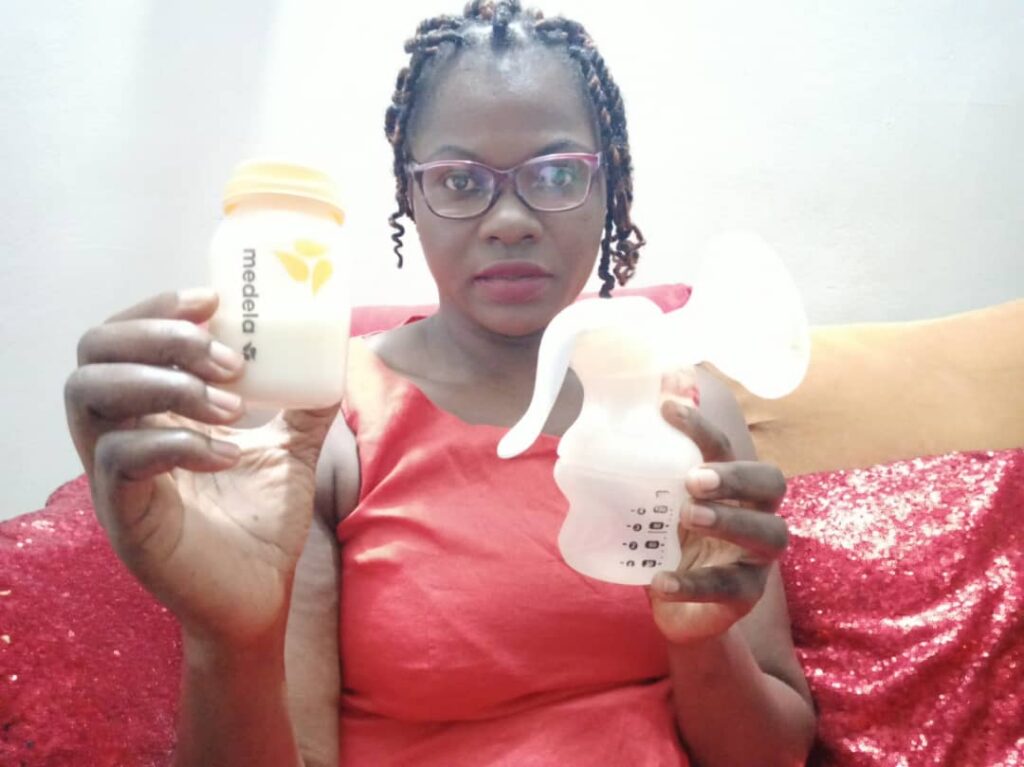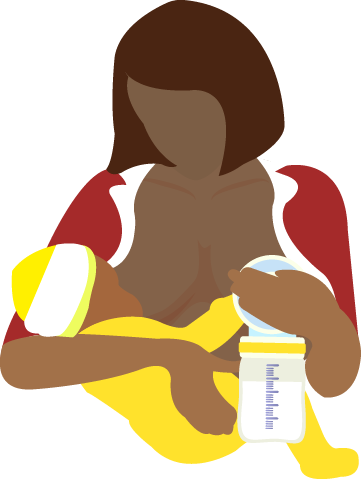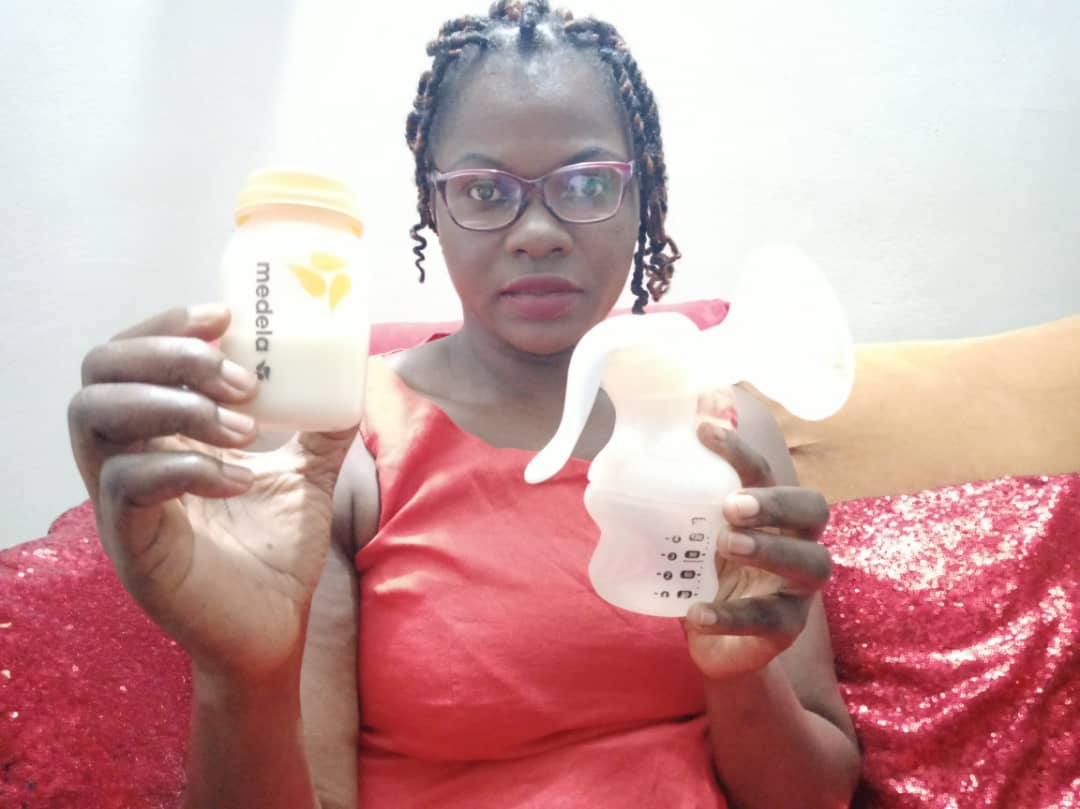
Janet posing with her manual pump and pumped milk. 
Janet posing with her manual pump and pumped milk.
As the World marks breastfeeding Week to celebrate each woman’s breastfeeding journey, many women out there are still struggling to juggle it with work and other responsibilities. Various studies have provided insight for the nutritional and health benefits of breastfeeding and its impact on lowering rates of childhood diseases and deaths. Globally, only 4 out of 10 women are able to begin breastfeeding within an hour of birth and practice exclusive breastfeeding up to six months. And in Tanzania, Unicef reported in May last year that 700,000 children are not breastfeed every year, as women fear their breasts will sag. It went further to point out that in 2014, 85,000 child deaths were linked to lack of breastfeeding related complications.
Inadequate breastfeeding therefore leads to unfavorable impact on neonatal, infant and young child health and development according to the World Breastfeeding Trends initiative. The World Health Organisation (WHO) has also outlined how breastfeeding provides major benefits to women health and is valuable to national productivity and economy. And for these reasons, I have decided to share my breastfeeding experience to inspire other women on their journey.
Many years ago, I would never have imagined that I would be able to breastfeed in public. But here I am, exclusively breastfeeding and pumping breast milk for the baby’s use when I am at work. I remember four years ago when I had my first baby, through caesarian section (CS). He made his way to the world at 35 weeks so I was advised that exclusive breastfeeding was the best for the baby to grow healthy. I managed to exclusively breastfeed for six months as per the World Health Organisation (WHO) recommendation though it was not easy. Here I was, with fresh CS wound and nothing had prepared me for this, let alone breastfeeding. The following morning during ward rounds, Dr Kaguta Munawar, a senior gynecologist at Aga Khan Hospital comes with his team and finds me struggling to force the baby’s mouth to my breast. He then instructed the nurses to teach me how to breastfeed which they did for the better part of the day. By the time I was leaving the hospital, I was trying my best. As a new mother, I had challenges with positioning the baby, had issues with getting him to latch on as sometimes I would wake up with engorged breasts, which are rock hard. At times he would breastfeed well and for long but another time, he would just snack on the breast milk and leave it. It was also a learning experience as I noticed that babies are born with a suckling reflex because the moment they latch on well, they just suckle. And nothing is more fulfilling than your little baby looking into your eyes for assurance that you will give them the best – it creates a lasting bond between the mother and the baby.
Supporting breastfeeding makes a great difference by keeping mothers on track especially when they leave the hospital and go home and when they resume work. I got support from my spouse who would make me soups and porridge besides refilling my water bottle to ensure I am not hungry and remain hydrated.
I would also wake up in the wee hours of the night to pump after Dr Mariam Noorani a pediatrician and lactation expert at Agakhan Hospital introduced me to the world of pumping and storing breast milk to ensure the baby has enough supply when I resume work after 84 days of maternity leave.
She was always on the standby answering questions anytime of the day and night about breastfeeding challenges including reflux and colic. She indeed walked with me through the journey until the baby’s digestive system matured. She also educated me on supply and demand of breastmilk. I also got massive support from Breastfeeding Support Group in Kenya – a facebook group where you ask any question when you are stuck and you get responses and messages of encouragement. They kept me going as you are in a group with mums either experiencing the same challenges or have faced them and are ready to share success tips with you on how to tackle the problem.
With constant pumping, I had enough stock but one day someone accidentally switched off the power connection to the milk freezer and the stock got spoilt. I had to start pumping again all night long just a day before resuming work. So I would restock everyday while I was working. It was tough journey but I kept my eyes on the prize – benefits of exclusive breastfeeding to ensure the baby is healthy.
There was also a day I got a call from the nanny that the stock had run dry so I had to pump at work and send milk home. At work, there was no space to pump so would squat under my locker or use a hidden corner in the library where I would cover myself and pump. A tip I would give for any mum to overcome this challenge is to either express or pump and do a few trials giving it to the baby through the bottle during maternity leave so that the baby get used to this feeding method as well to reduce many episodes of crying when one resumes work. It is noteworthy to mention that one should have enough feeding bottles to take the baby throughout the time one is at work. And ensure that you emphasize the issue of hygiene to the person taking care of the baby so that they constantly wash their hands and ensure all is clean before each feed. In as much as you may have a trusted nanny, it always make a difference when you wash and sterilize the bottles and the pump by yourself. And while at work, you
With my second baby in April this year, I was all set to breastfeed and had told the nurse just before my CS procedure that my baby should not be given formula. I requested that the baby be put on my chest so that he breastfeeds in the first hour of birth but this was not to be the case as anesthesia had not worn off completely besides the baby had been taken to the nursery for monitoring as he was big. (Seems like they haven’t seen giant babies from the Lake Zone) So I had to wait until the following day to be able to breastfeed. The following day at night, I made my way to the nursery and breastfed. This time round, I was better off as I had learnt from my first-born and this time round Agha Khan Hospital prepared us so well for breastfeeding as they used videos to educate us during ante-natal sessions and the nurses emphasized on it as well. I also discussed with Dr Kaguta during my clinic visits and he provided a lot pre-natal education on breastfeeding.
The transition to work from maternity leave is a very difficult phase as most babies reject the bottle when you give them, however, they later get used to it. I still pump milk at work though this time I approached the management and requested for a safe room to breastfeed, they also read my articles on breastfeeding and I was given a pantry to use for pumping milk during lunch break which I think is an achievement towards making exclusive breastfeeding for working mothers possible. I would pump milk then store in a cooler bag at work then take it home later on. I have medela double electric pump for use at home since it needs a power source to plug it in and an Avent plus Tommie Tippee hand pumps for use while am at work.
Then comes another challenge in the name of erratic power supply for those of us these sides of the Sahara. For instance, there was a day power was cut for 72 hours in our area so some milk got spoilt while I managed to save a few which I took to a friend who had a standby generator at least 22 kilometers away (Goba to Mikocheni) for safe storage until the power in our area was restored. So this journey of exclusive breastfeeding is not a walk in the park.
Another major challenge, which I think many working mothers also experience, is that the workload remains the same even while you exclusively breastfeed. For instance, I work until 3.00PM or 3.30 PM before leaving to go and breastfeed as the supply I leave in the morning usually runs dry by this time. Some of my colleagues are very supportive though to some male colleagues, it doesn’t make sense why I have to leave to go and either pump or breastfeed. They wonder why I don’t give the baby cow milk. Breastfeeding in public is also a challenge since at home, I have a luxury of pillows and couches but in public places a like church and restaurants, this is a bit challenging so you have to know how to position yourself and the baby to latch on well. And of course there are praying eyes as many people still objectify breasts, which should not be the case. The primary purpose for breast is to feed the babies. An indication that there is still a need of creating awareness on breastfeeding.
I was also encouraged by Dr Miriam Noorani and Dr Yassir Abdallah Aljaidi, a neonatologist and consultant paeditrician at Agakhan Hospital to create a breastfeeding support group where I encourage mothers and share with them tips on exclusive breastfeeding. In case they have any technical questions, Dr Mariam is always on standby to tackle them. I get many calls even in the middle of the night with mothers wanting tips on breastfeeding.
I also learnt a lot more about breastfeeding when I met lactation experts at the WHO’s headquarters in Geneva during the 71st World Health Assembly.
This is my parting shot; exclusive breastfeeding for six months is possible though a mother needs support from the family, community, the government (on policies and programmes,) employer and healthcare giver to make this journey successful and dramatically increase breastfeeding rates in Tanzania thereby improving children’s health and development.
The author is an ICFJ Fellow
The article was first published on The Citizen on this link: https://www.thecitizen.co.tz/magazine/1840564-5223894-o5192yz/index.html
https://www.thecitizen.co.tz/magazine/1840564-5223894-o5192yz/index.html





1 Comment
I wish all mothers can breastfeed their babies despite the many challenges please keep us informed